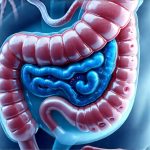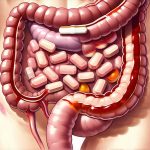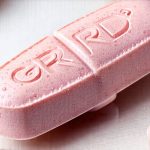Many people dismiss mild indigestion as an inconsequential part of life – something easily soothed with antacids or simply “lived with.” This seemingly harmless discomfort, however, can be indicative of deeper issues unfolding within the digestive system. Chronicling these fleeting instances of heartburn, bloating, or gas is crucial because persistent, unaddressed mild indigestion isn’t just a temporary nuisance; it’s often a signal that the delicate balance of your gut microbiome and the integrity of your intestinal lining are being compromised over time. Ignoring these signals can lead to a cascade of negative health outcomes far beyond digestive discomfort.
The human gut is an incredibly complex ecosystem, responsible not only for breaking down food but also for nutrient absorption, immune function, and even mental wellbeing. When mild indigestion becomes frequent, it’s frequently linked to factors like dietary choices, stress levels, or underlying sensitivities. Prolonged exposure to irritating foods or chronic stress can slowly erode the protective barrier of the gut lining, leading to increased permeability – often referred to as “leaky gut.” This compromised barrier allows undigested food particles, toxins, and bacteria to seep into the bloodstream, triggering inflammation and potentially setting the stage for a host of systemic health problems. Understanding this connection is vital to proactively managing digestive health and preventing long-term consequences. Considering the impact of dietary choices on the gut, understanding long-term effects is essential.
The Gut Lining: A Critical Barrier
The intestinal lining, comprised of tightly joined cells, acts as the body’s first line of defense against harmful substances. It’s specifically designed to selectively allow nutrients to pass into the bloodstream while keeping out pathogens, toxins, and undigested food particles. This selective permeability is maintained by a healthy gut microbiome – the diverse community of bacteria residing in our intestines. A balanced microbiome supports the integrity of the intestinal lining and aids in digestion, nutrient absorption, and immune regulation. Chronic mild indigestion often disrupts this delicate balance, leading to inflammation and weakening the tight junctions between intestinal cells. This weakening increases intestinal permeability, initiating what is commonly known as “leaky gut syndrome.”
When the gut becomes more permeable, larger molecules that shouldn’t be in the bloodstream can pass through, triggering an immune response. The body recognizes these foreign substances as threats and launches an inflammatory attack. Chronic inflammation isn’t just uncomfortable; it’s a root cause of many chronic diseases. Furthermore, the constant activation of the immune system can lead to autoimmune reactions, where the body mistakenly attacks its own tissues. This is why seemingly minor digestive issues can have far-reaching consequences for overall health – impacting everything from joint pain and skin conditions to allergies and mental health. The ability of our bodies to absorb nutrients effectively can be impacted by this process; understanding nutrient absorption is key.
The composition of our diet plays a significant role in gut lining integrity. Diets high in processed foods, sugar, and unhealthy fats can promote inflammation and disrupt the microbiome, while diets rich in fiber, prebiotics, and probiotics support a healthy gut environment. Stress also has a profound impact; chronic stress elevates cortisol levels, which can damage the intestinal lining and compromise immune function. Therefore, addressing mild indigestion isn’t just about relieving immediate symptoms – it’s about restoring the health of the gut lining and supporting overall wellbeing through dietary changes and stress management techniques. The effects of late-night eating on gut motility should also be considered when making lifestyle adjustments.
Nutrient Absorption & Long-Term Deficiencies
A compromised gut lining directly impacts nutrient absorption. When the intestinal barrier is weakened, essential vitamins, minerals, and amino acids may not be properly absorbed into the bloodstream, leading to deficiencies even with a seemingly balanced diet. This can manifest in various ways, including fatigue, weakness, impaired immune function, and cognitive decline. Specific nutrients are particularly vulnerable when gut health is compromised:
- Vitamin B12: Absorption of vitamin B12 requires intrinsic factor, produced by cells in the stomach lining. Inflammation from leaky gut can disrupt this process.
- Iron: Iron absorption relies on a healthy intestinal environment. Malabsorption leads to iron deficiency anemia.
- Fat-soluble vitamins (A, D, E, K): These vitamins require fat for absorption and a functioning lymphatic system, both of which can be impaired by gut dysfunction.
- Magnesium: Crucial for over 300 enzymatic reactions in the body; malabsorption leads to muscle cramps, fatigue and neurological symptoms.
The long-term consequences of these deficiencies are significant. For example, vitamin D deficiency is linked to weakened bones, increased risk of infections, and mood disorders. Iron deficiency can lead to anemia, causing fatigue and impaired cognitive function. Chronic nutrient deficiencies not only affect physical health but also contribute to mental health issues, as many nutrients play a vital role in brain function and neurotransmitter production. Addressing the root cause – gut health – is therefore essential for restoring optimal nutrient absorption and preventing long-term health problems. The influence of gut bacteria on mineral absorption should also be considered.
Identifying Underlying Causes
Pinpointing the underlying causes of chronic mild indigestion is crucial for effective management. This often requires more than just self-diagnosis; it involves a comprehensive evaluation, potentially including dietary changes, food sensitivity testing, and consultation with a healthcare professional. – Food intolerances: Common culprits include lactose, gluten, and fructose. An elimination diet can help identify trigger foods.
– Small Intestinal Bacterial Overgrowth (SIBO): Excessive bacteria in the small intestine can ferment undigested carbohydrates, leading to bloating, gas, and abdominal pain. Testing may be required for diagnosis.
– Stress & Anxiety: Chronic stress disrupts gut motility and weakens the intestinal barrier. Stress management techniques are essential.
Beyond these common causes, underlying conditions such as Helicobacter pylori infection or inflammatory bowel disease (IBD) can contribute to chronic indigestion. It’s important to rule out these possibilities with appropriate medical testing. A functional medicine approach often proves valuable in identifying multiple contributing factors and developing a personalized treatment plan that addresses the root cause of the problem, rather than simply masking symptoms. This might involve dietary modifications, supplementation to support gut healing, stress management techniques, and lifestyle changes. Understanding medication’s impact on the gut microbiome is also critical.
Restoring Gut Health: Practical Steps
Restoring gut health requires a multi-faceted approach focused on reducing inflammation, supporting the microbiome, and strengthening the intestinal barrier. A cornerstone of this is dietary modification. Reducing processed foods, sugar intake, and inflammatory fats while increasing fiber-rich foods, fruits, and vegetables is essential. Incorporating fermented foods like yogurt, kefir, sauerkraut, and kimchi introduces beneficial bacteria to the gut. Prebiotic-rich foods such as onions, garlic, asparagus, and bananas feed these beneficial bacteria, promoting their growth and diversity.
Supplementation can also play a role in gut healing. – Probiotics: Introduce beneficial bacteria to the gut. Choose strains specific to your needs.
– L-glutamine: An amino acid that supports intestinal cell repair.
– Collagen: Helps strengthen the gut lining.
– Omega-3 fatty acids: Reduce inflammation and support overall health.
Lifestyle changes are equally important. Managing stress through techniques like meditation, yoga, or deep breathing exercises can reduce cortisol levels and protect the gut lining. Regular exercise improves digestion and reduces inflammation. Getting adequate sleep is also crucial for gut health, as sleep deprivation disrupts the microbiome and weakens the immune system. Finally, staying hydrated by drinking plenty of water helps maintain a healthy digestive tract and supports nutrient absorption.
The Mind-Gut Connection & Holistic Wellbeing
The connection between the mind and gut – often referred to as the “gut-brain axis” – is increasingly recognized as critical for overall health. Stress, anxiety, and depression can significantly impact gut function, while conversely, a healthy gut microbiome influences mood and cognitive function. Chronic stress alters gut motility, increases intestinal permeability, and disrupts the balance of gut bacteria. This can lead to digestive symptoms but also contributes to mental health problems like anxiety and depression.
Conversely, a healthy gut microbiome produces neurotransmitters like serotonin – often called the “happy hormone” – which plays a vital role in mood regulation. A diverse and balanced microbiome supports optimal brain function and emotional wellbeing. Therefore, addressing mild indigestion isn’t just about physical health; it’s about nurturing the mind-gut connection and promoting holistic wellbeing. Integrating stress management techniques into daily life is essential for protecting gut health and improving mental health outcomes. This might involve practices like mindfulness meditation, yoga, or spending time in nature.
Ultimately, recognizing that seemingly mild digestive discomfort can be a sign of deeper imbalances within the body is the first step towards proactive health management. By addressing the root causes of chronic indigestion – strengthening the gut lining, restoring the microbiome, and nurturing the mind-gut connection – we can unlock lasting improvements in both physical and mental wellbeing. The effects of antibiotics on gut health should also be considered when evaluating potential causes of digestive issues. Also, the impact of long term constipation can contribute to imbalances in the microbiome and gut lining integrity.


















